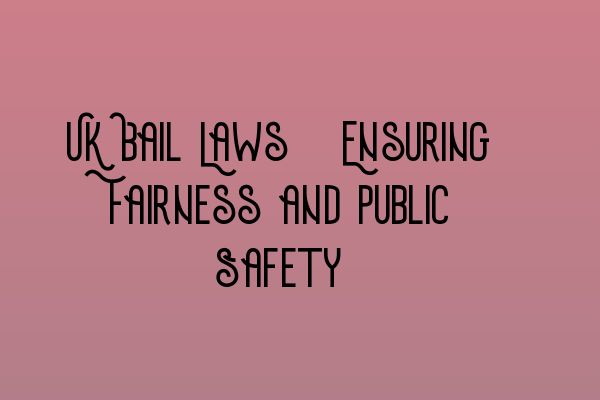UK Bail Laws: Ensuring Fairness and Public Safety
Bail is an integral part of the criminal justice system in the United Kingdom. It plays a crucial role in ensuring both fairness for the accused and the safety of the public. Understanding the complexities and nuances of UK bail laws is essential for legal professionals involved in criminal practice.
Fairness and Presumption of Innocence
The cornerstone of UK bail laws is the principle of presumption of innocence. Every individual accused of a crime has the right to be considered innocent until proven guilty. Bail laws uphold this fundamental right by allowing individuals to seek release from custody while awaiting trial.
By granting bail, the court recognizes the need to treat the accused as innocent until proven guilty. It also acknowledges the importance of preventing unnecessary pre-trial detention, which can have adverse effects on the accused’s personal and professional life.
Related Article: Workshops and Seminars on Criminal Practice: Expanding Your Expertise
Ensuring Public Safety
While fairness is paramount, the safety of the public must also be considered. UK bail laws aim to strike a balance between granting liberty to the accused and protecting society from potential harm. The court carefully evaluates various factors to determine whether granting bail poses a risk to public safety.
These factors may include the nature and severity of the alleged offense, the accused’s criminal history, their ties to the community, and the likelihood of reoffending. In cases where there is a substantial risk to public safety, the court may impose certain conditions or deny bail altogether.
Related Article: Updates in UK Criminal Laws: Staying Informed and Prepared
Bail Conditions and Monitoring
When bail is granted, the court may impose specific conditions to ensure compliance and mitigate potential risks. These conditions can include reporting to a police station, surrendering travel documents, adhering to curfews, or even wearing electronic monitoring devices.
Regular monitoring and supervision play a vital role in ensuring the accused’s compliance with bail conditions. It allows authorities to promptly address any breaches and ensures the safety of the public. Legal professionals must stay updated with the evolving technologies used for monitoring and understand their impact on bail proceedings.
Related Article: Mock Tests for SQE Criminal Practice: Exam Simulation for Success
Challenges and Reform
Over time, there have been debates and discussions regarding the effectiveness and fairness of UK bail laws. The criminal justice system continually evolves to meet the changing dynamics of society.
Legal professionals must stay informed about any updates or proposed reforms in UK bail laws. Staying abreast of these changes enables practitioners to provide the best possible representation and ensure fairness for their clients.
Related Article: Enhancing Your SQE Criminal Law Study Group Experience
Conclusion
UK bail laws play a critical role in ensuring fairness for the accused and protecting the public. The principles of presumption of innocence and public safety are carefully balanced within the framework of bail laws.
Legal professionals involved in criminal practice must have a deep understanding of these laws to effectively represent their clients and uphold justice. Staying updated with the latest developments and reforms is essential to navigate the complexities of the UK criminal justice system.
Related Article: Decoding Criminal Evidence Rules: A Detailed Analysis
